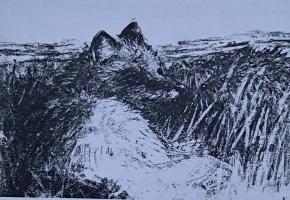Copy Link
Add to Bookmark
Report
NL-KR Digest Volume 04 No. 59

NL-KR Digest (6/15/88 18:14:36) Volume 4 Number 59
Today's Topics:
Feasible Learnability and Locality of Grammars (UNISYS seminar)
Talk by Michael Lesk
BBN AI Seminar -- Phylis Koton
Lang. & Cognition Seminar
MT Conference Budapest
Submissions: NL-KR@CS.ROCHESTER.EDU
Requests, policy: NL-KR-REQUEST@CS.ROCHESTER.EDU
----------------------------------------------------------------------
Date: Wed, 8 Jun 88 15:19 EDT
From: finin@PRC.Unisys.COM
Subject: Feasible Learnability and Locality of Grammars (UNISYS seminar)
AI SEMINAR
UNISYS PAOLI RESEARCH CENTER
Feasible Learnability and Locality of Grammars
Naoki Abe
Computer and Information Science
University of Pennsylvania
Polynomial learnability is a generalization of a complexity theoretic
notion of feasible learnability originally developed by Valiant in the
context of learning boolean concepts from examples. In this talk I
will present an intuitive exposition of this learning paradigm, and
then apply this notion to the evaluation of grammatical formalisms for
linguistic description from the point of view of feasible
learnability. In particular, a novel, nontrivial constraint on the
degree of ``locality'' of grammars will be defined which allows
grammatical formalisms of much linguistic interest to be polynomially
learnable. If time allows possible implications of this result to the
theory of natural language acquisition will also be discussed.
2:00 pm Wednesday, June 1
Paoli Auditorium
Unisys Paloi Research Center
Route 252 and Central Ave.
Paoli PA 19311
-- non-Unisys visitors who are interested in attending should --
-- send email to finin@prc.unisys.com or call 215-648-7446 --
------------------------------
Date: Tue, 7 Jun 88 17:04 EDT
From: Peter de Jong <dejong@wheaties.ai.mit.edu>, Laureen Fletcher <fletch%eyes@media-lab.media.mit.edu>
Subject: Talk by Michael Lesk
"Does Technology Affect How People Read?"
Lessons from the 18th Century. This is about reprinting the first
edition of "Tristram Shandy;" duplicating 18th century fonts, etc.
with some discussion of the switch from reading aloud to reading
silently.
"How to Tell a Pine Cone
from an Ice Cream Cone -- Sense
Disambiguation Using Machine
Readable Dictionaries"
Does a "fireman" feed fires or put them out? It depends on whether or
not he is on a steam locomotive. This talk explains a scheme for
deciding which sense of an ambiguous word is meant by counting
overlaps of words in definitions in a machine-readable dictionary.
Michael Lesk
Division Manager
of Computer Sciences Research
Bell Communications Research
Morristown, New Jersey
Friday, June 10, 1988
2:00 - 3:00 p.m.
E15-401
Host: Peg Schafer
------------------------------
Date: Fri, 10 Jun 88 13:52 EDT
From: Marc Vilain <MVILAIN@G.BBN.COM>
Subject: BBN AI Seminar -- Phylis Koton
BBN Science Development Program
AI Seminar Series Lecture
MODEL-BASED DIAGNOSTIC REASONING USING PAST EXPERIENCES
Phylis Koton
MIT Lab for Computer Science
(ELAN@XX.LCS.MIT.EDU)
BBN Labs
10 Moulton Street
2nd floor large conference room
10:30 am, Tuesday June 14
The problem-solving performance of most people improves with experience.
The performance of most expert systems does not. People solve
unfamiliar problems slowly, but recognize and quickly solve problems
that are similar to those they have solved before. People also remember
problems that they have solved, thereby improving their performance on
similar problems in the future. This talk will describe a system,
CASEY, that uses case-based reasoning to recall and remember problems it
has seen before, and uses a causal model of its domain to justify
re-using previous solutions and to solve unfamiliar problems.
CASEY overcomes some of the major weaknesses of case-based reasoning
through its use of a causal model of the domain. First, the model
identifies the important features for matching, and this is done
individually for each case. Second, CASEY can prove that a retrieved
solution is applicable to the new case by analyzing its differences from
the new case in the context of the model. CASEY overcomes the speed
limitation of model-based reasoning by remembering a previous similar
case and making small changes to its solution. It overcomes the
inability of associational reasoning to deal with unanticipated problems
by recognizing when it has not seen a similar problem before, and using
model-based reasoning in those circumstances.
The techniques developed for CASEY were implemented in the domain of
medical diagnosis, and resulted in solutions identical to those derived
by a model-based expert system for the same domain, but with an increase
of several orders of magnitude in efficiency. Furthermore, the methods
used by the system are domain-independent and should be applicable in
other domains with models of a similar form.
------------------------------
Date: Tue, 14 Jun 88 08:51 EDT
From: Dori Wells <DWELLS@G.BBN.COM>
Subject: Lang. & Cognition Seminar
BBN Science Development Program
Language & Cognition Seminar Series
CHILDREN'S REORGANIZATION OF KNOWLEDGE
IN THE DOMAIN OF ASTRONOMY
Stella Vosniaoov
University of Illinois
BBN Laboratories Inc.
10 Moulton Street
Large Conference Room, 2nd Floor
10:30 a.m., Wednesday, June 15, 1988
Abstract: Some preliminary findings from an ongoing project on children's
acquisition of knowledge in the domain of astronomy will be presented.
The findings indicate that elementary school children's early beliefs
are consistent with their phenomenal explanation of a stationary flat
earth and an up and down movement of the sun and moon. These beliefs
appear to be quite resistant to change and rise to a number of
misconceptions which reveal children's difficulty to assimilate
current scientific views.
------------------------------
Date: Fri, 10 Jun 88 08:28 EDT
From: New Directions in Machine Translation - Budapest <mcvax!dlt1!mtconf@uunet.UU.NET>
Subject: MT Conference Budapest
As was announced earlier, BSO/Research (Utrecht) and the John von Neumann
Society for Computing Sciences (Budapest) jointly organise the international
conference
NEW DIRECTIONS IN MACHINE TRANSLATION
on 18 and 19 August 1988 (Thursday and Friday before Coling) in Budapest.
We can now announce the final list of lectures. The conference can still
accept some participants (but not papers, there are invited speakers only).
If you want to register, please contact the
John von Neumann Society for Computing Sciences
Conference Secretariat
Pf. 240
H-1368 Budapest 5
Hungary
Telephone: .. 36 / 1 / 329390
Telex: 225792 mtesz h
The registration fee is 170,- DM (programme, proceedings, welcome party,
refreshments and lunches). Hotel accomodation can be ordered via the
Conference Secretariat.
Please do not try to register via this electronic address which is in
the Netherlands, not in Hungary.
The list of speakers is:
W. JOHN HUTCHINS (Norwich):
Recent developments in machine translation
- a review of the last five years.
TIBOR V'AMOS (Budapest):
Language and computer society.
IVAN I. OUBINE (Moscow):
The state of the art in machine translation in the USSR.
CHEN YUAN (Peking):
Esperanto-based MT research in China.
CHRISTIAN BOITET (Grenoble):
Pros and cons of the pivot and transfer approaches in
multilingual machine translation.
MICHIKO KOSAKA (New York):
A sublanguage approach to Japanese-English machine translation.
IV'AN GUZM'AN DE ROJAS (La Paz):
ATAMIRI - interlingual MT using the Aymara language.
KLAUS SCHUBERT (Utrecht):
The architecture of DLT - interlingual or double direct?
CHRISTA HAUENSCHILD (Berlin):
Discourse structure - some implications for machine translation.
JUN-ICHI TSUJII (Kyoto):
What is a cross-linguistically valid interpretation of discourse?
CHRISTIAN GALINSKI (Vienna):
Advanced terminology banks supporting knowledge-based MT
Some reflections on the costs for setting up and operating a
terminological data bank.
WERA BLANKE (Berlin):
Terminologia Esperanto-Centro
Efforts for terminological standardization in the planned language.
DIETRICH WEIDMANN (Schaffhausen):
Universal applicability of dependency grammar.
BENGT SIGURD (Lund):
Translating to and from Swedish by SWETRA - multilanguage
translation system.
G'ABOR PR'OSZ'EKY (Budapest):
Hungarian - a special challenge to machine translation?
CLAUDE PIRON (Geneva):
What we can learn about languages from mistakes made by
professional translators.
------------------------------
End of NL-KR Digest
*******************



























